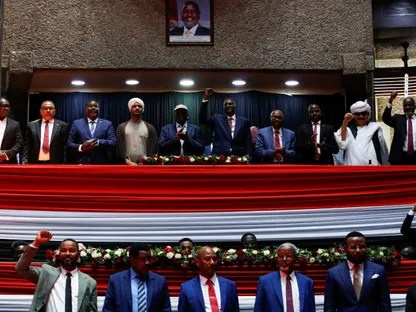Met with International and Regional Rejection: The Militia Government in Turmoil

Sudan Events – Agencies
The international community has unsettled the Rapid Support Forces (RSF) militia and its allies by rejecting their parallel government, even before it officially emerges. This government, backed by the UAE and Kenya in an attempt to undermine Sudan’s legitimate administration, has encountered numerous obstacles before receiving a decisive blow from influential regional and global powers.
Warnings:
UN Secretary-General António Guterres’ spokesperson expressed concern over the RSF’s planned announcement of a parallel government, warning that such a move would further divide Sudan and exacerbate the crisis.
Stéphane Dujarric emphasized that maintaining Sudan’s unity, sovereignty, and territorial integrity remains essential for achieving a lasting resolution to the conflict.
In a new development, the UN rejected any move that deepens divisions among Sudanese factions. The UN Secretary-General’s Personal Envoy to Sudan, Ramtane Lamamra, warned that any action widening the gap between Sudanese parties instead of uniting them is “undesirable.”
The United States echoed similar concerns, warning that a parallel government would complicate Sudan’s crisis. The U.S. cautioned that any attempt by the RSF and its allied groups to establish a government in the areas under their control, parallel to the Sudanese Sovereignty Council, poses a serious risk of dividing the country.
A U.S. State Department spokesperson told Al-Sharq that such attempts by the RSF and its allies would not contribute to peace and security in Sudan. He added that forming a government in RSF-controlled areas could lead to de facto partitioning of the country.
Meanwhile, Turkey’s Foreign Ministry warned against actions that could harm Sudan’s unity, territorial integrity, sovereignty, and independence. Russia and China also issued warnings about the consequences of establishing a parallel government, stressing that Sudan needs an end to the war rather than another government.
Similarly, the UK, France, and Qatar expressed concerns over the announcement of a parallel government in militia-controlled areas.
Clear Positions:
Egypt, Saudi Arabia, and Kuwait have taken a firm stance, outright rejecting any government declared in Sudan outside the existing legitimate administration.
Egypt’s Foreign Ministry affirmed Cairo’s support for Sudan’s state institutions, including the Sudanese Armed Forces, and stated it would not recognize any other government.
Saudi Arabia’s Foreign Ministry also rejected any illegitimate steps taken outside Sudan’s official institutions, warning that such moves could threaten national unity and fail to represent the people’s will. In a statement, the ministry reaffirmed the Kingdom’s unwavering commitment to Sudan’s security, stability, and territorial integrity.
Kuwait’s Foreign Ministry similarly denounced any unlawful measures outside Sudan’s official institutions, considering them interference in its internal affairs and a threat to its unity. It also underscored the importance of protecting Sudan’s official institutions and reaffirmed its stance on the country’s sovereignty and stability.
The Arab League reiterated its commitment to Sudan’s unity and territorial integrity, rejecting any steps that could lead to the country’s division.
Impact of These Developments:
Experts believe that the international condemnation—especially from influential global and regional players such as Saudi Arabia, Qatar, and Egypt—has effectively buried the militia-led government before its official announcement. They argue that any government lacking international recognition will not endure, particularly given the UN’s reservations about it.
Given this widespread rejection, the UAE and Kenya will likely be forced to support the militia government in secret—just as they are already doing through military and logistical aid to the RSF.
Experts also highlight that the strong and clear stance taken by Saudi Arabia, Qatar, and Kuwait will likely influence the rest of the Gulf Cooperation Council (GCC). Analysts predict that the GCC will officially reject the RSF’s government, leaving the UAE with no option but to remain silent—neither endorsing nor opposing the militia’s administration.
(Source: “Sudanese Echoes”)



